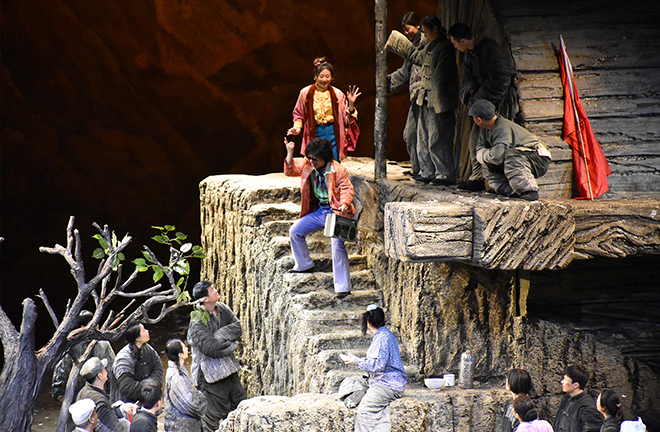Scholars seek literature’s educational value

A dramatic performance of The Ordinary World, an excellent literary work that has inspired generations of Chinese youth Photo: CFP
JI’NAN—The intersection and integration of literature and pedagogy is one of the hot topics in the field of interdisciplinary research. The first seminar on interdisciplinary research of literature and education was held in Ji’nan, June 26–27. Scholars exchanged views on such topics as “the interaction and symbiosis of literature and education” and “the influence of pedagogy on Chinese and foreign literature,” seeking new paths for interdisciplinary research of literature and pedagogy.
Literature’s educational function
“Literary education occupies an important position in moral education,” said Su Hui, a professor from the School of Chinese Language and Literature at Central China Normal University. Cross-over studies of literature and pedagogy are necessary for current new liberal arts construction. We should inherit and carry forward ancient Chinese traditions of literary education and conduct theoretical discussions and practice on different levels of educational elements and educational functions of literature, in efforts to promote their creative transformations and innovative development under the new historical context.
“Apart from moral teaching as the basic function of literature, aesthetic non-utilitarianism is another literary function, while aesthetics offers a way of understanding literature and obtaining edification,” said Nie Zhenzhao, a professor from the School of International Studies at Zhejiang University.
Ethical literary criticism insists that the core value of literature is not providing entertainment but teaching through the form of entertainment. Literature provides life experience for self-improvement, supplies life paradigms to ethically view life and society, sparks moral enlightenment needed in material and spiritual life, and gives moral guidance for civilizational progress.
An educational function is an attribute inherent in literature, said Jiang Chengyong, a professor from the Institute of Western Literature and Culture at Zhejiang Gongshang University. The Horatian platitude, which advocates that poetry should both “instruct and delight,” has a long-standing tradition in Western literature, which highlights the educational function of literature.
However, 19th-century Romanticism in literature put forward the theoretical propositions and creative ideas of “non-utilitarian” and “art for art’s sake,” Jiang continued. They rejected the educational function and other social functions of literature in rebellion against the the Horatian platitude upheld throughout the history of Western literature, significantly impacting modern Western literature. Nevertheless, this does not mean that Romanticism has completely subverted the educational function of traditional Western literature. The educational function of literary creations has not disappeared despite the influence of Romanticism.
Foreign literature teaching
In an era of rapid development, literature is being challenged by marginalization, said Wang Lixin, dean of the College of Chinese Language and Culture at Nankai University. Literature touches on both humanistic traditions and aesthetic feelings, which endows literary criticism with a special status in current foreign literature education. Standing in front of a literary world constructed by writers and the real world we live in, teachers are expected to deal well with the dual logical relationships of “narratives and counter-narratives” so as to fully leverage the effect of literature on improving students’ personalities.
“In the context of new liberal arts construction, foreign literature teaching should consolidate its foundation and further innovate,” said Liu Jianjun, a distinguished professor from Shanghai Jiao Tong University. We should focus on texts and documents, supplemented by the teaching of literary history, and cultivate students’ thinking skills, especially their ability to raise questions, through “back to the text” and then “jump out of the text” teaching strategies, while at the same time constantly adjusting the composition of the existing knowledge system and updating teaching concepts.
According to Wang Songlin, deputy dean of the Faculty of Foreign Languages at Ningbo University, the teaching and research of English departments should strive to firmly establish the concept of humanistic education from the two aspects of language and literature. Literary education should return to its original aspiration and be based on classics, working to enhance students’ aesthetic appeal through careful classics reading and accessing the ethical value of classic works. Literature, a silent and soft education means, forms an effective way to cultivate students with a sound personality.
English undergraduate majors generally offer such literary courses as the history of British and American literature and selected literary reading. Luo Lianggong, dean of the School of Foreign Languages at Central China Normal University, noted some common problems in teaching English literature, such as more emphasis on literary knowledge but less on literary ability, more on selective reading and less on theoretical learning. The literary education of English majors should be ability-oriented, specifically raising students’ literary appreciation ability, literary criticism ability, cross-cultural ability, and critical thinking ability.
Literary education should move towards in-depth teaching, encourage metacognitive knowledge (as opposed to factual knowledge, conceptual knowledge, or procedural knowledge), and perform the educational function of literature, said Wang Zhuo, dean of the School of Foreign Languages at Shandong Normal University. As an interdisciplinary field, the pedagogy of literature should recruit graduate students and researchers across colleges and across disciplines for better teaching and research. The interdisciplinary integration of literature and pedagogy can be realized via researching literary works from a pedagogical perspective or via investigating educational phenomena and issues from a literary perspective.
Edited by YANG LANLAN
